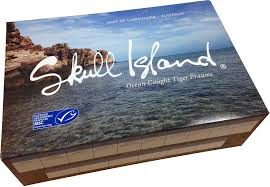Patagonian toothfish, also known as Chilean sea
bass, lives in the cold waters of the Atlantic and sub-Antarctic. This slow
growing fish generally lives for up to 24 years and grows to over two meters in
length. It’s a species of huge ecological importance, but also supports fishing
communities throughout Southern America and the Antarctic islands who fish it
commercially for markets in USA, EU and Japan.
In the past, illegal fishing for Patagonian
toothfish by unregulated vessels threatened the sustainability of fish stocks,
undermined the livelihoods of fishing communities and also had detrimental
impacts on other species, including unintentional catch of some albatross
species.
Today more than half of the total global
catch of toothfish is certified to the MSC standard for sustainable fishing.
These fisheries meet the demanding standards for fisheries management and
sustainability required for seafood to be sold with the blue MSC ecolabel. One such fishery is Austral Fisheries based in West Australia, and the subject of tonight's show. We also talk about their Skull Island Prawns, a tiger prawn wowing American diners and also a sustainable fishery. We also welcome John Susman of Fishtales, consultants to the fishing industry, to help tell the story.
Dylan Skinns
General Manager, Sales and Marketing
Austral Fisheries is an Australian commercial fishing
company based in Perth, operating vessels in the sub-Antarctic catching
Patagonian Toothfish; and the Gulf of Carpentaria catching Banana and Tiger
prawns. All product is wild caught, sold Australia wide and exported to
international markets. All of Austral's wild caught seafood is certified
sustainable and managed by the Marine Stewardship Council (MSC) and, most
recently, the business and its wild caught products have been certified as
carbon neutral – a world first. Glacier 51 Toothfish and Skull Island Tiger
Prawns are Austral's multi-award winning seafood brands.
The Austral team are big believers of ‘telling the story’,
branding its product and selling sustainability to differentiate away from the
commodity seafood space. Up until 2002, 100% of Austral’s production was
exported as a commodity. The Austral team has since transformed the way in
which it sells, markets and delivers its products to the world by creating
powerful new Australian seafood brands, which tell a story of provenance,
quality, and sustainability. The ratio is now split 50:50 (export v domestic)
with high value retail and wholesale brands residing on the best menus around
the world such as Nobu 57 in New York and At.Mosphere Burj Khalifa Dubai.
The Heard Island and McDonald Islands (HIMI) Patagonian toothfish fishery has received recertification to the MSC standard for sustainable fishing. Originally certified in 2012, the fishery was once riddled with illegal and unregulated fishing for the valuable species, found across the southern ocean.
But due to robust and collaborative management, there has not been illegal fishing in the region since 2006, according to the Commission for the Conservation of Antarctic Marine Living Resources (CCAMLR), the international science-based body with 25 member nations tasked with managing Antarctic resources.
The HIMI fishery is managed by the Australian Fisheries Management Authority (AFMA) in accordance with measures set by CCAMLR. In addition, both operators, Austral Fisheries and Australian Longline, are active members of COLTO, the Coalition of Legal Toothfish Operators.
“We’re incredibly proud of this fishery, toothfish was once considered an unsustainable choice and today more than half the global catch is MSC certified and continues to meet our scientific standard for sustainability,” said Patrick Caleo, MSC Regional Director Asia Pacific.
 |
| Chef Matt Broussard, Glacier 51 rendition @acookcalledmatt |
Skull Island Prawns
The Northern Prawn Fishery (NPF) is often
referred to as Australia’s last ‘wild frontier’, across Australia’s top end.
The fishery extends from the low water mark to the outer edge of the
Australian fishing zone. Its eastern extremity lies at Cape York in
Queensland and stretches west to Cape Londonderry in Western Australia.
52
vessels are licensed to operate in the MSC certified NPF,
which covers approximately 880,000 square kilometres. Less than 12% of
this area is fished.
The Northern Prawn Fishery was certified by the Marine
Stewardship Council (MSC) as a sustainable and well managed
fishery in November 2012. Woolworths generously contributed $25,000
towards the MSC certification through their Fresh Food Future grant,
and this fishery becomes the first tropical prawn fishery to be certified as
sustainable in the world. MSC certified sustainable Banana Prawns and
Tiger Prawns can be found from this fishery in your local Woolworths seafood
cabinet.
Austral
Fisheries are members of the Northern Prawn Fishery Management Advisory
Committee (NORMAC), which is an
advisory body to the Australian Fisheries Management Authority (AFMA).
NORMAC is dedicated to maintaining the sustainability of the Northern Prawn
Fishery and has a strong history in the area of responsible and pro-active
action in fisheries management.
Skull Island…
…is an island in Australia’s Northern Territory and it’s
where we catch the biggest tiger prawns in Australia’s Northern Prawn Fishery.
It is part of the Sir Edward Pellew Group of islands in King
Ash Bay at the mouth of the McArthur River. The inshore protected waters
adjacent to Skull Island provide the ideal habitat for tiger prawns. Large
expansive seagrass beds, strong tidal movement and ample food allow juvenile
tiger prawns to grow to sizes selected for the Skull Island brand.
Caught, packed and snap frozen at sea from the pristine
waters of Australia’s Gulf of Carpentaria, ensure the eating characteristics of
Skull Island tiger prawns remain intact until they are enjoyed on the plate.




No comments:
Post a Comment